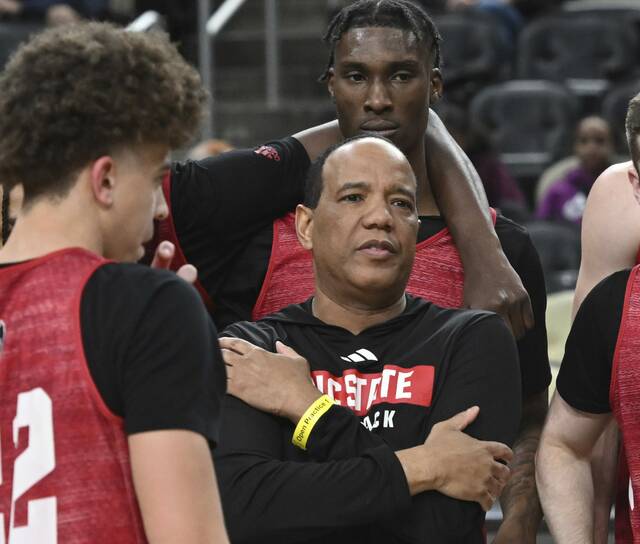https://staging.triblive.com/sports/struggling-pitt-n-c-state-prepare-to-confront-each-other-plus-a-future-based-on-finances/
Struggling Pitt, N.C. State prepare to confront each other, plus a future based on finances

Over the next two weeks, seasons of profound disappointment will end for coaches Jeff Capel of Pitt and Kevin Keatts of N.C. State. Their teams will meet Wednesday at the Lenovo Center in Raleigh, N.C., with those men bringing to their benches a combined 27 seasons of head coaching experience.
The slippage from the recent past has been dramatic, especially for N.C. State.
• The Wolfpack (11-18, 4-14) is in danger of sitting out the ACC Tournament if it remains among the bottom three teams in the conference standings.
• The Panthers (16-13, 7-11) have lost 11 of their past 15 games.
One year made a big difference.
N.C. State rallied last season from 10th place in the ACC standings — coincidentally, where Pitt sits today — to win the conference championship and reach the Final Four. Pitt won 46 games the past two seasons, including two in the NCAA Tournament.
But Capel and Keatts are interested only in finishing this season strong and starting to rebuild for 2025-26 as soon as the lights go out on this one. But their jobs are not easy and — for the first time as college coaches — they must depend on their schools having enough money to offer players to build the best rosters.
During the weekly ACC coaches’ conference call Monday, Capel was asked how much of a role money plays in the ACC falling behind the SEC and Big 12. After all, the SEC has eight teams and the Big 12 and Big Ten five each in the current Associated Press Top 25 rankings, and both likely will put a handful more into the NCAA Tournament. Only Duke, Clemson and Louisville from the ACC are locks for the tournament.
Capel didn’t dance around the question when asked how he would respond to charges that the ACC is down.
“Well, it is.” he said. “That’s the reality. I’m not going to give you coach-speak. It is.”
Then, when asked about the financial aspects of talent acquisition in the ACC, Capel had additional honest responses.
“(Money) has a lot to do with that,” he said. “As difficult as that may be to say or to hear, that is where we are. I would challenge people to look at — I don’t know how you get this — but look at what each school in our league in men’s basketball is spending on their roster, compared to the other leagues.
“I think we have really good coaches in this league. Man, you have to have good players, too. It’s different with how it was three years ago or five years ago.”
Capel pointed to Louisville — a team that has defeated him twice this season in tightly contested games — as an example of how fortunes can turn quickly. The Cardinals (23-6, 16-2 ACC) are ranked No. 14 in the Associated Press Top 25 after compiling records of 12-52 overall and 5-35 in the ACC the previous two seasons.
“What they have done in this short period of time,” Capel said, “and the energy that was in that building (Saturday night), it was back to what it was when I first got this job at Pitt or when I was at Duke when they were winning. They went out and I think they spent a good amount, too. They got really good players, good guys who fit what (coach) Pat (Kelsey) wants to do. And they’ve been able to change it pretty quickly.”
Capel, who has played and coached in the ACC for 18 seasons, said his conference fell behind in preparing for a future based on finances.
“I do think there were some administrators, leaders, ADs, presidents, I think there were some (who said), ‘We think this is going to go away. It’s not going to last. We’re not going to do as much because we don’t have to,’ ” Capel said. “I’ve heard people say, ‘We have a really good coach. That’s our secret weapon.’
“I do think there has been some arrogance there of like, ‘We’re not going to get into this. We don’t have to get into this.’
“I would bet you the investment in NIL (by top-25 teams) is pretty high.”
Keatts presided over a team last season that took a 17-14 record and four-game losing streak into the ACC Tournament, won five games in five days and four more in the NCAA Tournament before losing to Purdue in the national semifinals.
“We can make an argument that team may have had the lowest NIL budget of any team that’s ever made the Final Four,” he said. “But we did what we had to do. I don’t think we ever really capitalized on — because we did it with such a low budget — what it took to compete in today’s era.”
Like Capel, he is hopeful of becoming more competitive on and off the court going forward.
“Where it will change is the commitment that we’re going to get from the athletic department and revenue sharing (likely coming next academic year),” he said. “It’s going to help a place like N.C. State more than most places. We’re grateful for what we have and what we were able to collect from the collective, but we were behind to start and I think things can change.”
Copyright ©2025— Trib Total Media, LLC (TribLIVE.com)
